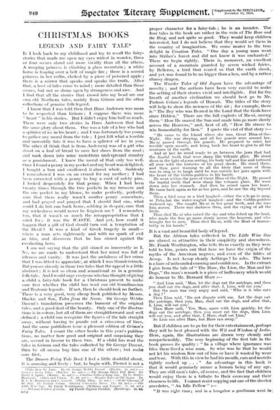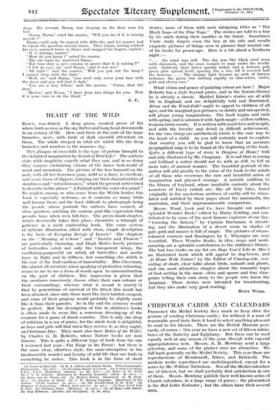CHRISTMAS BOOKS
LEGEND AND FAIRY TALE*
IF I look back to My childhood and try to recall the fairy- stories that made me open my eyes widest in wonder, three or four scenes stand out more vividly than all the others. A weeping princess is climbing a glass mountain ; a white horse is leaping over a belt of magic. fire ; there is a second princess in her coffin, choked by a piece of poisoned apple ; there is a mirror that speaks and speaks the truth. After that, a host of tales conic to mind ; more detailed than those scenes, but not so shone upon by strangeness and awe. And I Lind that all the stories that crowd into my head are our own old Northern tales, mainly from Grimm and the other collections of genuine folk-legend.
I know that I was told then that Hans Andersen was more to be respected than Grimm ; I suppose there was more " heart " in his stories. But I didn't enjoy him half as much. There were only two stories in Hans Andersen that had the same glory about them. One was a tale of a boy who had a splinter of ice in his heart.; and I was fortunately too young to gather any moral from the tale ; I just felt what a terrible and unworldly fate it was to have a splinter of ice in you. The other (I think that is from Andersen) was of a girl who stood on. a loaf of bread to save her shoes from the mud ; and sank down into some monstrous underground country as a punishment. I knew the moral of that only too well. Once I found a penny in my pocket and my heart was delighted. I bought a bun and swallowed it almost whole. Suddenly I remembered I was on an errand for my mother ; I had been entrusted with a penny to buy a card of safety pins. I looked desperately for that penny. When I had been twenty tunes through the two pockets in my trousers and the one pocket in my blouse, to make perfectly, perfectly sure that there really wasn't another penny somewhere, and had prayed and prayed that I should find one, what could .I do but. rim back home, sobbing in despair, sure that my wickedness would never be forgiven me ? I remember, too, that it wasn't so much the misappropriation that I cried for ; it was the WASTE. And yet, how could it happen that a gift of God should turn out a temptation of the Devil ? It was a kind of Greek tragedy in small— where a man acts righteously and with no spark of evil in him, and discovers that he has sinned against the .everlasting laws.
I am not saying that the girl sinned as innocently as I. No, we are made to understand that her mind was full of idleness and vanity. It was just the awfulness of her crime
that I was fitted to appreciate, at which I was thunderstruck. Bayou see already in those two tales that the appeal is a little abstract ; it is not so clean and sensational as in a genuine
folk-tale. And I would urge everyone who has thought of eying a child a fairy-tale book for a Christmas present to make sure first whether the child has read our old Scandinavian
• and Teutonic legends. If not, then he should look no furthei. There is a very good, very cheap book published by Messrs.
Mackie and Son; Tales from the Norse. Sir George Webbe Dasent's translation preserves the humour of the original tales, and a good deal of the beauty.. Only one of the illustra- tions is in colour, but all of them are straightforward and well defined ; a child can recognize the figures of the tale straight away, without having to puzzle out a criss-cross of lines. And the same publishers issue a pleasant edition of Grimm's Fairy Tales. I count the other books in this year's publica-
tions, no matter how good and original and surprising they are, second in favour to these two. If a child- has read the tales in Grimm and the tales collected by Sir George Dasent, then by all means buy him one of the others ; but make sure first.
The Dumas Fairy Tale Book I feel a little doubtful about. It is amusing and lively ; but, to-begin with, Pierrot is not a • Tales freer the Norse. By Sir George Webbe Basent. • (Blarkie. 2s. net.)--- Grimm's Fairy Tales. (Blaekie. 6s. net.)----The Barna& Fairy Tale Book. By Harry A. Spurr. (Warne. 6s. net.)—.Croatian Tales of Lang Ago. By Iv. Berne- Mazuranie. (Allen and Unwin. 7s. 6d. net.)—Wonder Tales of Old Japan . By B. L. Henderson and C. Calvert. (Philip Allan. 6s. net.)—At the Gateways of the hay. By Padraic Comm.li (Oxford University Press. Its. 6d. net.)—Phe Lane II' ise (Inc. By Frank Worthington. (Williams and Norgate. 7s. M. net.) --Wit and Wisdom of India. By Pandit Shkaima Sbankar: (Routtedge; -314 net.) proper character for a fairy-tale ; he is an invader. The four tales in the book are rather in the vein of The Rose and the Ring, and not quite so good. They would keep children, interested, but I do not believe that they would set them in, • the country of imagination. We come nearer to the true delight in Croatian Tales. " One day a young man went into Striber's forest and did not know it was enchanted." There we begin rightly. There is, moreover, an excellent account of a mountain guarded by seven wicked fairies, by Belleroo, a bird that roared so that the earth shook, , and yet was found to be no bigger than a hen, and by a rather clumsy dragon.
The Wonder Tales of Old Japan have the advantage of novelty ; and the authors have been very careful to make: the setting of their stories vivid and intelligible. Bid for the. breath of another civilization we should best go to Mr.. Padraic Colum's legends of Hawaii. The titles of the story will help to show the newness of the air ; for example, there- is " The Boy who was Reared-in the Land that the Gods have since Hidden." There are the . full exploits of Ma-ui, among them " How He snared the Sun and made him go more slowly! across the Heavens," and, best of all, " How He strove to win Immortality for.Men." I quote the end of that story :- " He came to the Island where she was, Great Hina-of-the- Night. She was sleeping, and all her guards were around her. Ma-ui passed through her guards. Ho prepared to enter her terrible open mouth, and bring back her heart to give to all the creatures of the earth.
And at last he stood ready to go between the jaws that had the fearful teeth that were sharp like volcanic glass. He stood' there in the light of a sun-setting, his body tall and fine and tattooed all over with the histories of his great deeds. He stood there; and then gave warning to all the birds that none of them was to sing or to laugh until he was outside her jaws again with the heart of the Goblin-goddess in his hands.
He went within the jaws of Great Hina-of-the-Night. He passed the fearful teeth that were sharp like volcanic glass. He went down into her stomach. And then he seized upon her heart. He came back again as far as her jaws, and he saw the sky beyond them.
Then a bird sang or a bird laughed—either the e-le-pa-io sang, or Paka-kai the water-wagtail laughed—and- the Goblin-goddess wakened up. She caught Ma-ui in her great teeth, and she tore him across. There was darkness then, and the crying of all the birds.
Thus died Ma-ui who raised the sky and who fished up the land, who made the Sun go more slowly across the heavens, and who brought fire to men. Thus died Ma-ui, with the Meat of Immor- tality in his hands."
It is a vast and beautiful body of legend.
But the African tales collected in The Little Wise One are almost as attractive in their simplicity and shrewdness. Mr. Frank Worthington, who tells them exactly as they were told to him, points out that here we have the origin of the myths of the American negroes, and even of the fables of Aesop. Is not Aesop clearly Aethiops ? he asks. The hero is a hare of unbounded cunning and confidence. In the extract I give from the talc of " The Hare, the Lion, the Man and his Dogs," the man's remark is a piece of buffoonery which would do honour to Mr. Bernard Shaw :- " And Lion said, Man, let the dogs eat the antelope, and then you shall eat the dogs, and after that, I, Lion, will eat you.' But the man was very angry and said, ' Who is it who eats a dog ? '
Then Lion said, Do not dispute with me. Let the dogs eat the antelope, then you, Man, shall eat the dogs, and after that, I, Lion, will eat you.' Then Hare said, Yes, Man, agree with Lion quickly, let the dogs eat the antelope, then you must eat the dogs, then Lion will eat you, and after that, I, Hare, shall eat Lion.'
So Lion ran after Hare, but Hare ran away."
But if children are to go far for their entertainment, perhaps they will be best pleased with the Wit and Wisdom of India. Here, again, the illustrations arc drawn very cleanly and comprehensibly. The very beginning of the first tale in the book proves its quality : " In a village where ignorance was bliss there lived a wise man. So wise was he that he would not let his wisdom flow out of him or have, it wasted by wear and tear. With this in view he had his mouth, ears and nostrils tightly corked up . . " An advantage in this book is that it would genuinely amuse a human being of any age. They are still men's tales, of course, and the fact that children would enjoy them is a tribute to their economy and their closeness to life. I cannot resist copying out one of the shorter, anecdotes, " An Idle Fellow-"
It was night time ; and in a bungalow a gentleman went to i
sloop. His servant, Rama, was sleeping on the floor near his bed.
Rama, Rama,' cried the master, Will you see if it is raining outside I ' Rama could only be roused with difficulty and his master had to repeat the question several times. Then Rama, having rubbed his eyes, yawned twice or thrice and mapped his fingers, replied : ' It is raining, master.'
How do you know ' asked his master.
The cat came in,' answered Rama.
But how does a cat's coming in prove that it is raining ?' 'I felt its coat. sir,' said Rama, and it was wet.'
' All right !' said the master, Will you put out the lamp ? I cannot sleep with the light.'
' Well, sir,' said Rama, you need only cover your face with the shoot and you will find it dark.'
You are a lazy follow,' said the master. Come, shut the door.'
' Master,' said Rama, I have done two things for you. Now it is your turn to do the third.' "
A. C.



























































 Previous page
Previous page